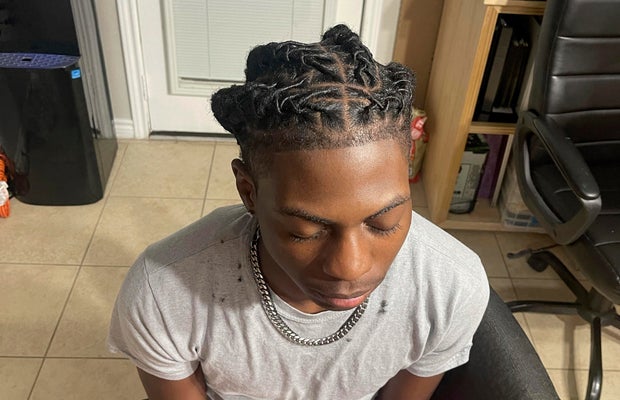A black high school student in Texas who was punished for almost his entire junior year According to his lawyer, he would rather have left school because of his hairstyle than be suspended for another year.
But Darryl George, 18, is eager to return to his Houston high school, Barbers Hill High School in Mont Belvieu, for his senior year. He has asked a federal judge to issue a temporary restraining order that would prevent district officials from further punishing him for not cutting his hair. It would allow him to return to school while a federal lawsuit he has filed proceeds.
George’s request comes after U.S. District Judge Jeffrey Brown in August dismissed most of the claims brought by the student and his mother in a federal lawsuit alleging that school administrators committed racial and gender discrimination in their punishments for him. George was suspended from school after being told his hair grew below his eyebrows and earlobes.
The judge only upheld the claim of gender discrimination, questioning whether the school district’s hair length rule did more harm than good.
“Judge Brown, please help us so that I can go to school like a normal teenager during the ongoing trial,” George said in a sworn statement filed last month.
Brown has scheduled a hearing for October 3 in Galveston at George’s request.
Darresha George / AP
In court documents filed last week, attorneys for the school district argue that the judge does not have the authority to issue a restraining order because George is no longer a student in the district.
“And the fact that George has withdrawn from the school district does not deprive him of the right to seek damages, although the school district maintains that George has suffered no constitutional harm and is not entitled to damages,” attorneys for the school district said.
The school district defends the dress code, saying the policy is intended to “teach student grooming and hygiene, instill discipline, prevent disruptions, avoid safety hazards, and teach respect for authority.”
In court documents filed last week, Allie Booker, one of George’s attorneys, said the student was “forced to disenroll” from Barbers Hill High School in Mont Belvieu and transfer to another high school in another Houston district because Barbers Hill officials suspended him on the first and second days of the new school year, which started last month.
This “caused him significant emotional distress, ultimately leading to a nervous breakdown. As a result, we had no choice but to remove him from the school environment,” Booker said.
George’s departure “was not a matter of choice, but of survival,” but he is eager to return because his mother moved to the area because of the quality of the district’s schools, Booker said.
George was kept out of his regular high school classes for most of the 2023-24 school year, when he was a junior, because the school district said his hair length violated the dress code. George was forced to either serve an in-school suspension or spend time in an out-of-school disciplinary program.
The district has argued that George’s long hair, which he wears to school in tied and twisted locs atop his head, violates policy because if left loose, it would fall below his shirt collar, eyebrows or earlobes. The district has said other students with locs comply with the length policy.
George’s federal lawsuit also alleged that his sentence violated the CROWN law, a recent state law that prohibits racial discrimination in hair. The CROWN Act, which was debated before the George hair dispute and went into effect in September 2023, prohibits employers and schools from punishing people because of hair texture or protective styles, including afros, braids, locs, twists or Bantu knots.
In February, a state judge ruled in a lawsuit filed by the school district that the punishment did not violate the CROWN Act.
Barbers Hill’s hair policy was also challenged in a federal lawsuit filed in May 2020 by two other students. Both withdrew from the high school, but one returned after a federal judge granted a temporary injunction, saying there was “a substantial likelihood” that his rights to free speech and to be free from racial discrimination would be violated if he were suspended. That lawsuit is still pending.








